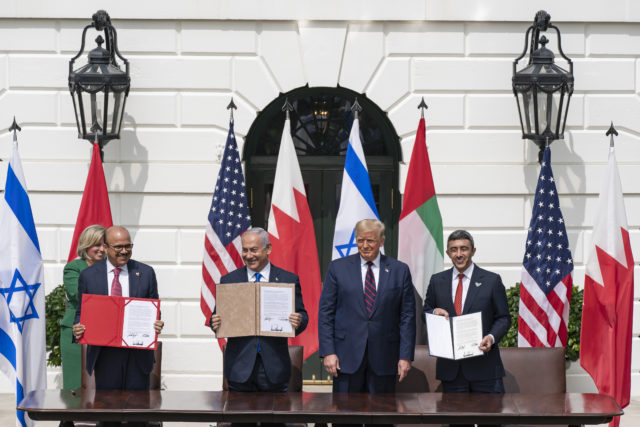
President Donald Trump is planning a trip to the Gulf States in May. According to the White House, he will visit Saudi Arabia, Qatar, and the United Arab Emirates (UAE). In anticipation, others are shifting gears, raising the question, “Are we getting closer to, or farther from, a peaceful region?”
Jordan just banned the Muslim Brotherhood (MB). The country’s Interior Minister said all MB activities would be banned in the country, and anyone promoting the group’s ideology will be held accountable by law. He added that the ban includes publishing, and requires “closure and confiscation” of all MB offices and property.
This, along with the Kingdom’s ban on Al Jazeera, puts Jordan in line with Egypt, Saudi Arabia, and the UAE. Israel and Bahrain also ban Al Jazeera, as does the Palestinian Authority (see below). All these entities understand that the Qatari government-owned media outlet magnifies and encourages radical MB ideology, promotes Hamas and Palestinian Islamic Jihad, and attacks conservative Arab governments.
Jordan’s actions garnered praise from a prominent UAE entrepreneur posting on X: “The UAE was among the first to ban the Muslim Brotherhood and warn the world about its ideology … This is not Islamophobia! This is about national security, public safety, and peace.”
This is a step forward.
Lebanon
While Lebanon’s President Joseph Aoun agrees that the Lebanese Armed Forces (LAF) should be the only armed force in the country, he is hedging over what happens to the remaining Iran-supported Hezbollah forces and weapons. “Any divisive issue should not be approached through the media or social platforms, but rather through quiet and responsible communication with the concerned parties.”
Hezbollah wouldn’t agree “to give up its arms de facto out of principle,” Karim Safieddine, a Lebanese political writer and doctoral student in sociology at Pittsburgh University, told Al Jazeera. Instead, they could disarm “in exchange for big benefits.”
Now, that is a bit of bravado, as Saudi reports indicate that more than 200 of the remaining Hezbollah commanders have left Lebanon for South America, where the organization has a well-entrenched drug and arms smuggling network.
Apparently, the commanders fear they could be targeted if more of its infrastructure is dismantled — though whether it would be targeted by the IDF or by unhappy Lebanese citizens is unclear. In any case, there are still tens of thousands of Hezbollah supporters in the country, and Lebanon still permits the airing of Al Jazeera.
But, an Israeli military source told Ynet, “In large areas, the Lebanese army is taking action against Hezbollah to a much greater extent than we expected.” Israel’s decimation of Hezbollah offers Lebanon its best chance for stability and prosperity in decades. If they can take it. It is a maybe.
The Palestinian Authority
It almost sounded as if Mahmoud Abbas, the corrupt dictator of the Palestinian Authority (PA), in the 20th year of his single, elected 4-year term, had come to grips with the monstrosity of Hamas’ behavior. Abbas called on Hamas to “release the hostages.” And, indeed, he did call Hamas “sons of b****es,” a huge insult.
But this is not about peace. Abbas opposes the continued holding of hostages by Hamas because he, Abbas, is paying a price. And Israel is winning. He told an audience:
They don’t want to hand over the American hostage. You sons of b****es — hand over what you have and get us out of this. Don’t give Israel an excuse. Don’t give them an excuse. Hamas has given the criminal occupation excuses to commit its crimes in the Gaza Strip, the most prominent being the holding of hostages. Why have they taken them hostage? I am the one paying the price. Our people are paying the price, not Israel … My brother, just hand them over. [emphasis added]
The banning of Al Jazeera by Abbas should be seen in this context. Al Jazeera, and the Government of Qatar, support Hamas over the PA and incite violence against both the PA and Israel. While the latter is acceptable to him, the former is not.
And Abbas isn’t too keen on Americans, either. He told his audience: “They [the Americans] said: Normalize, or something like that. You know the Americans; the Americans are like this. May their father be cursed [Laughter and applause]. I am not a great Arab leader. I am a dwarf, this small. Thirty-three times I told them, ‘No!’”
This is not a man seeking a resolution of the conflict either with Israel or the United States. This one is a no.
Finding Peace
The Abraham Accords of 2020 split the region. There remain those like Lebanese Sunni Islamic scholar Aboubaker Zahabi, who, during a protest in Beirut, declared: “To the sons of Zion, our religion is the religion of jihad. We will come to you and slaughter you.”
But there is also Khalifa, who marked Holocaust Memorial Day: “Standing here today as an Emirati and a believer in tolerance, coexistence and peace, I honor the memory of Holocaust victims and pay tribute to their memory by working to create a world where dignity is upheld and diversity is cherished.”
And Mohamed Albahraini of Bahrain, who wrote: “#Holocaust Remembrance Day. Asking God for the victims of our #JEWISH brothers and sisters mercy and forgiveness. May their souls rest in peace forever.”
As the President prepares for his trip, more Khalifas and Mohameds — and fewer Aboubakers — means more possibility that the region’s upheaval will ultimately result in peace. Good luck, President Trump.

